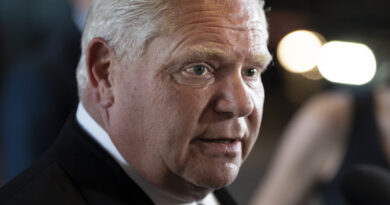Commentary
So I
see in the news where the feds are going to build a squillion homes or so, “unlocking the door to the middle class for millions.” Gosh. How grand. Nice of them. Except it does call to mind Owen Wilson’s question to Jackie Chan in “Shanghai Knights”: “What in our history together makes you think I’m capable of something like that?”
Finance Minister and Deputy PM Chrystia Freeland
promised that by hurling $6 billion at the problem, “We are going to turbocharge the construction of new homes.” And “turbocharging” a major economic sector sounds great, though not as great as letting millions shivering in the shabby working-class dark into warm middle-class light. But if you really know how, and housing secretly is a federal responsibility contrary to the
“that was then” claim of one J. Trudeau, why haven’t you already? And since you haven’t, what makes you so sure you can?
The question haunts me particularly because
another news story said Freeland recently assured journalists “her government plans to honour the fiscal guardrails it pledged in the fall, including the promise to keep the federal deficit capped at $40.1 billion for the 2023-24 fiscal year. But a slew of announcements ahead of the federal budget, including billions for housing and national defence, are raising a big question: How will the Liberals make the math work?”
Their self-confidence is as blatant as it is puzzling. As Andrew Coyne recently
pointed out, in presenting the 2023 federal budget Freeland blithely blithered, “By exercising fiscal restraint, we are ensuring that we can continue to invest in Canadians and in the Canadian economy for years to come.” A.k.a. by not spending we can keep spending.
There is no reason to doubt the sincerity of this self-portrait in red ink. And yet, Coyne illustrated with a scary chart, “program spending over the five years FY 2023-2027 is now running more than $20 billion a year over what was projected in last year’s budget; more than $30 billion annually over the projections in fall 2021, and more than $40 billion over Budget 2021.”
If that’s restraint, maybe try profligacy. But this inexplicable confidence is mysteriously widespread. Our Laurentian elite seems broadly, if weirdly, convinced of the almost unlimited capacity of governments they dominate. Ottawa can solve any problem including, a real example,
people getting hit on the head. And high taxes, spending, and deficits are all fine because the state uses resources more productively than the private sector (through some version of the fabled Keynesian “multiplier”) so, as Freeland
is unduly fond of saying, “we can’t afford not to.”
Aaargh, you might say. Time to throw the bums out. After all, Conservative Leader Pierre Poilievre just growled all the right noises at the recent Strong and Free Conference including
how “If [Trudeau] had read Nineteen Eighty-Four, he would have thought it was an instruction manual”. Ha ha. And “
We believe that a dollar in the hands of the person who earned it is always more powerful than in the hands of the politician who taxed him.”
OK, then. What should government stop trying to do for that rugged individualist? What public sector program or entity would Poilievre abolish?
Maybe
dairy subsidies? Heck no. Instead, he recently
said he’d support the Liberal budget if it scrapped the carbon tax on farmers, built homes not bureaucracy, and capped government spending.
Now those specifics are rubbish. The first introduces yet another loophole instead of simplifying the tax code. The second is a cute slogan, not a plan. And the third has been tried and failed repeatedly so it’s a gimmick, ignorance, or both. But far worse is that Poilievre professes himself fine with federal spending rocketing from $296 billion in 2015 to $490 billion now provided it doesn’t get any higher.
There’s nothing government does now that he wants it to stop attempting. So he shares this omnipotent-state delusion. And journalists don’t challenge him on what specifically he’d cut lest he actually think of something.
What gives everyone so much faith in government? It can’t be our history together. Which leaves what exactly?
Views expressed in this article are opinions of the author and do not necessarily reflect the views of The Epoch Times.



